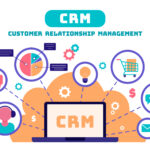Introduction: What is Lead Management System Software?
In today’s fast-paced business world, managing leads efficiently can make or break the success of a company. Lead management system software is essential for businesses that want to streamline the process of capturing, nurturing, and converting leads into loyal customers. This software plays a pivotal role in automating the tasks associated with managing leads and provides businesses with the tools they need to effectively track and engage potential customers throughout the entire sales journey. Whether you’re a small business or an enterprise, understanding the importance of lead management system software can significantly improve your sales performance.
1. The Basics of Lead Management System Software
Before diving into its importance, it’s essential to understand what a lead management system is. A lead management system is a tool that helps businesses track and manage potential customers (leads) from the moment they first interact with the company until they make a purchase decision. This software typically includes features like:
-
Lead segmentation
-
Integration with CRM
These features ensure that businesses never lose sight of valuable leads and can take proactive steps toward converting them.
2. Streamlining Lead Capture and Organization
One of the primary functions of a lead management system is to capture and organize leads efficiently. In the absence of such software, businesses often rely on manual methods, which can be error-prone and time-consuming. Lead management systems help automate lead capture from multiple sources such as websites, landing pages, social media, and email campaigns.
By centralizing lead data into a single system, businesses can easily track and categorize leads based on their origin, interests, behavior, and demographic information. This organization ensures that no lead is ever lost, and sales teams can prioritize the most promising leads.
3. Improving Lead Nurturing
Not every lead is ready to make a purchase immediately. Effective lead nurturing is crucial to guide leads through the sales funnel. Lead management system software helps businesses implement automated nurturing campaigns that engage leads with the right content at the right time.
Through email marketing, personalized content, and follow-up reminders, businesses can keep leads engaged and move them closer to a decision. A well-organized lead nurturing process ensures higher conversion rates, as it builds trust and educates leads over time.
4. Enhancing Lead Scoring and Qualification
Lead scoring is the process of ranking leads based on their likelihood of converting into customers. This is where lead management system software shines by automating the scoring process. The software evaluates lead behavior (e.g., website visits, email clicks, social media interactions) and assigns scores that help sales teams prioritize their efforts.
By focusing on the highest-scoring leads, sales teams can spend more time on leads that are likely to convert, improving efficiency and boosting sales productivity.
5. Boosting Sales Team Collaboration
In many organizations, sales teams work in silos, with different team members handling different aspects of the sales process. A lead management system centralizes all lead-related information in one platform, enabling collaboration among sales representatives and other departments.
Sales reps can easily share insights, track lead status, and update lead information in real-time, ensuring seamless communication and a more coordinated approach to closing deals. This collaborative environment enhances team efficiency and accelerates the sales cycle.
6. Tracking and Reporting Lead Progress
Lead tracking is a critical aspect of the sales process. A lead management system provides sales teams with the tools to track every lead’s journey from initial contact to conversion. With detailed reports and dashboards, businesses can gain insights into the performance of each lead, identifying which leads are moving through the sales funnel and which are stagnating.
This ability to track and measure lead progress helps sales teams focus on the most promising opportunities and adjust their strategies as needed. Real-time tracking allows for better decision-making and ensures that no lead is left behind.
7. Increasing Lead Conversion Rates
The ultimate goal of lead management software is to convert leads into customers. By automating many aspects of the sales process, from lead capture to nurturing and follow-up, businesses can significantly increase conversion rates. The software ensures that leads are contacted promptly, nurtured with personalized content, and guided through the sales process in a way that maximizes the likelihood of closing a deal.
Additionally, features like automated reminders and follow-up alerts ensure that sales reps never miss an opportunity to convert a lead into a paying customer.
8. Maximizing Sales Pipeline Visibility
Visibility into the sales pipeline is critical for effective sales forecasting and decision-making. Lead management software provides comprehensive views of the entire sales funnel, giving businesses a clear picture of where each lead stands. This visibility enables sales managers to forecast revenue accurately, adjust strategies, and identify potential bottlenecks in the sales process.
With clear insights into lead behavior and pipeline progression, businesses can make data-driven decisions that improve overall sales performance.
9. Integrating with Other Business Tools
A key feature of modern lead management systems is their ability to integrate with other software tools such as Customer Relationship Management (CRM) platforms, email marketing tools, and social media management platforms. This integration ensures that all lead-related data flows seamlessly between systems, reducing manual data entry and providing a unified view of customer interactions.
For example, when a lead fills out a contact form on a website, the information is automatically captured in the lead management system, and relevant follow-up tasks are assigned to the sales team. This automation reduces administrative work and ensures that leads are followed up promptly.
10. The Role of Lead Management Software in Business Growth
In a competitive market, businesses need to leverage every advantage they can to grow and thrive. Lead management software is a key driver of growth by helping businesses capture more leads, nurture them effectively, and convert them into loyal customers. By automating many aspects of the sales process and providing sales teams with the tools they need to succeed, businesses can scale their operations without sacrificing quality.
As companies grow, the complexity of managing leads increases. A robust lead management system ensures that businesses can handle an expanding customer base while maintaining a high level of personalized engagement. This scalability makes lead management software a critical component of long-term business success.
Conclusion: The Importance of Lead Management System Software for Your Business
In today’s digital world, lead management system software is no longer a luxury—it’s a necessity. By improving lead capture, nurturing, tracking, and conversion, this software empowers businesses to optimize their sales process and achieve higher growth. Whether you’re a small business looking to organize your leads or a large enterprise aiming to streamline your sales pipeline, lead management software provides the tools and insights needed to drive sales success.
By automating time-consuming tasks, improving team collaboration, and providing in-depth insights, a lead management system allows businesses to focus on what matters most—building relationships with customers and growing their business. Investing in lead management software is one of the smartest decisions any business can make to ensure long-term success in today’s competitive market.














